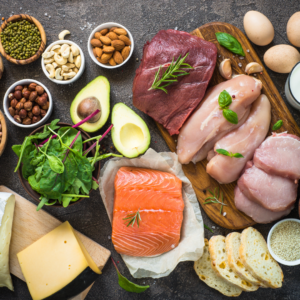05 Nov 7 essential nutrients for women
In this blog post, we dive into the 7 essential nutrients every woman should be consuming. This information is important when planning your diet and can help you to maintain a healthy lifestyle for years to come.
We discuss what each nutrient does, why it’s so important for women, and how much of each nutrient you need daily. The last section is a list of foods that are excellent sources of these seven key nutrients. Read on to learn more about these essential nutrients

1. Vitamin D –
Iron is an essential mineral that our bodies need. It helps with the production of red blood cells, which carry oxygen to all parts of the body and it also aids in energy production. Iron deficiency can lead to fatigue, lack of concentration, dizziness, headaches and more serious health problems. Here are some tips on how you can increase your iron intake without taking supplements or passing out at work from too much kale!
Tips for increasing iron intake:
-Add a teaspoon of blackstrap molasses to your coffee every morning -Eat leafy greens like spinach -Try adding beans or lentils into your diet -Take an iron supplement if necessary

2. Iron – Essential for the production of red blood cells and energy
Iron is an essential mineral that our bodies need. It helps with the production of red blood cells, which carry oxygen to all parts of the body and it also aids in energy production. Iron deficiency can lead to fatigue, lack of concentration, dizziness, headaches and more serious health problems. Here are some tips on how you can increase your iron intake without taking supplements or passing out at work from too much kale!
Tips for increasing iron intake:
-Add a teaspoon of blackstrap molasses to your coffee every morning -Eat leafy greens like spinach -Try adding beans or lentils into your diet -Take an iron supplement if necessary

3. Calcium – Necessary for a healthy heart, muscles, nerves, teeth, and bones
Do you know how important calcium is to your health? It’s the key building block of bones, teeth, nerves, muscles and can help maintain a healthy heart. Calcium is also vital for muscle function, blood clotting and maintaining normal blood pressure. A lack of calcium can lead to osteoporosis in adults or rickets in children.
If you are concerned about getting enough calcium in your diet there are some simple ways to get more! Dairy products like milk, yogurt and cheese are naturally high in calcium so they’re a great choice when looking for dairy options. Leafy greens like spinach have lots of calcium too which makes them an excellent addition to any salad!

4. Omega-3 Fatty Acids – Found in fatty fish like salmon or tuna; helps lower cholesterol levels
Omega-3 fatty acids are essential for a healthy diet and can be found in fatty fish like salmon or tuna. These fats assist with lowering cholesterol and triglycerides, which is great for those with heart disease or diabetes. The best way to consume these fats is by eating cold water fish at least once per week or by taking an omega-3 supplement that delivers both EPA and DHA.
For people who have difficulty swallowing pills, the gelcap form of omega-3 supplements might be more digestible than other formats such as softgels or liquids. Omega-3s have been shown to reduce inflammation in the body, so they may also help relieve symptoms of arthritis, psoriasis, eczema, asthma and allergies.

5. Protein – Needed to build muscle mass and repair tissues
Protein is a major nutrient required by the body to build muscle mass and repair tissues. Protein should be consumed at every meal, however it is not always easy to get enough protein from just food alone. This blog post will explore different sources of protein that can be used as an alternative source for those struggling with getting their daily requirements in.
The first thing we need to talk about are eggs! Eggs are one of the best sources of protein out there and they’re super cheap too! Just because you don’t like scrambled eggs doesn’t mean you can’t use them as a great source of protein – try making omelettes or egg muffins instead!
6. Zinc – Important for immune function as well as cell growth
Did you know that zinc is important for immune function as well as cell growth? Zinc aids in the production of white blood cells, which help fight bacteria and other infections. It also helps wounds heal faster by boosting our body’s natural healing process. This mineral is an essential trace element for human health and it’s found in a wide variety of foods including pumpkin seeds, cashews, oysters, beef liver and more! Read this blog post to find out how much zinc we need each day to keep our bodies running at their best!
Zinc – Important for Immune Function as Well as Cell Growth.



Sorry, the comment form is closed at this time.